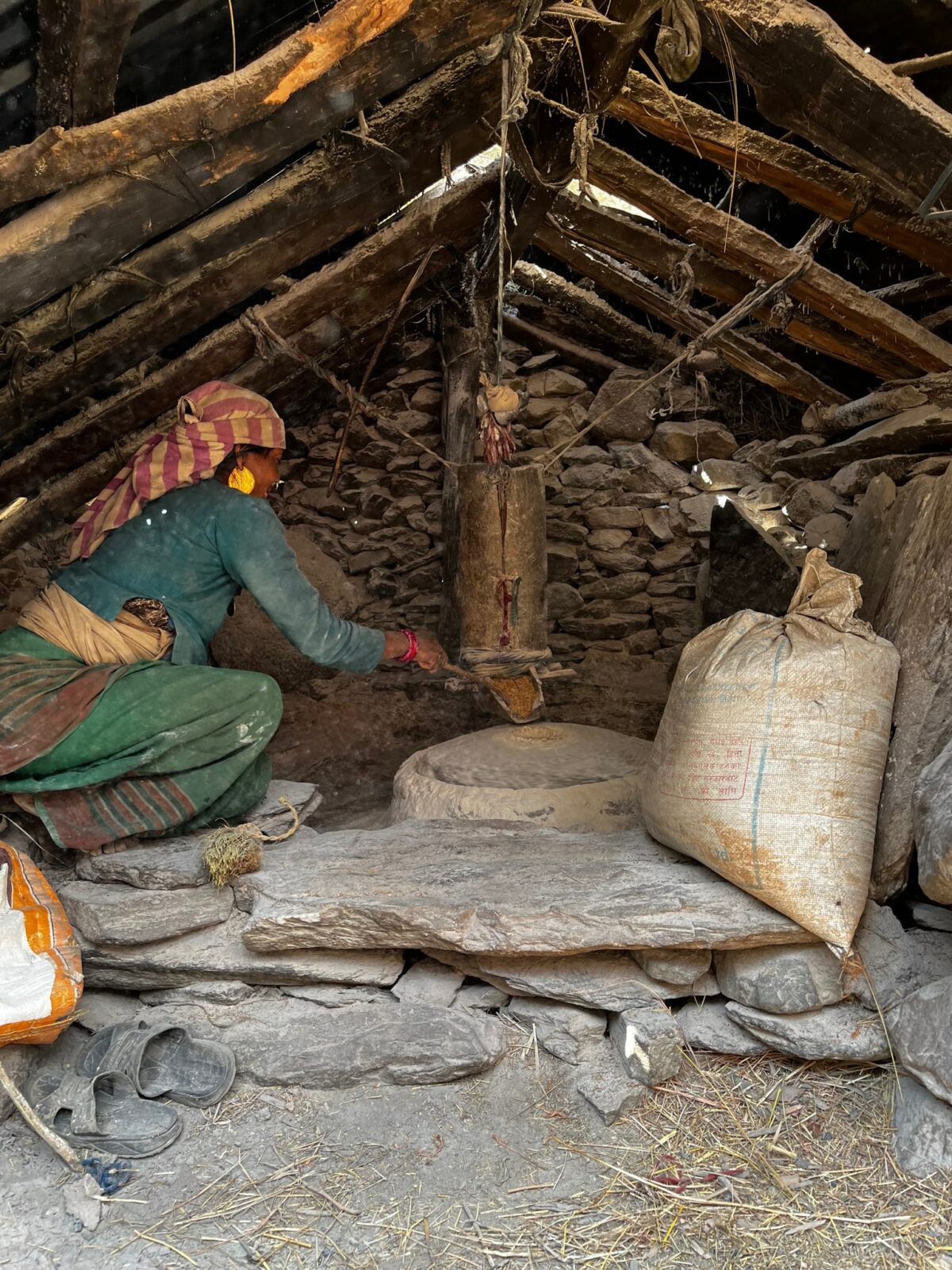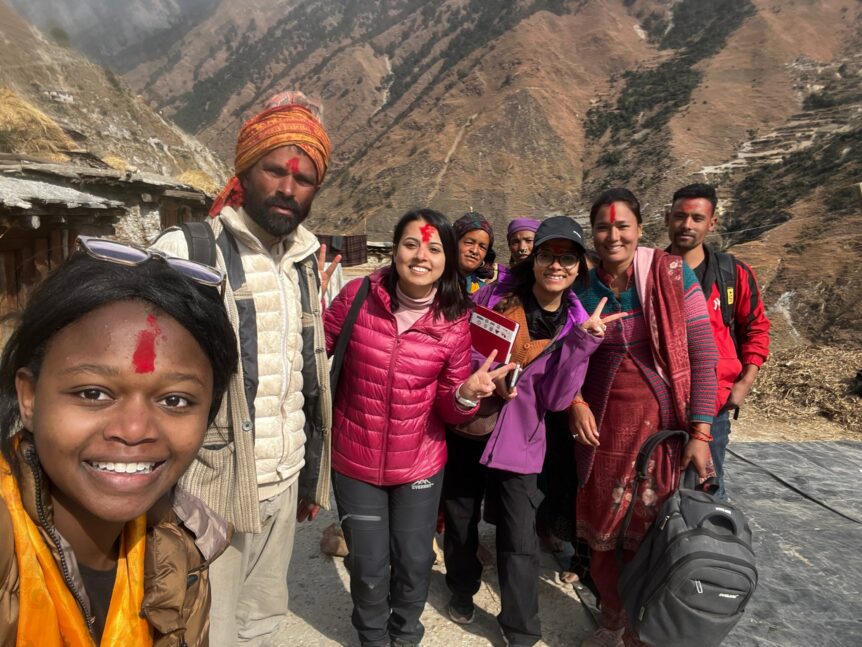Above: Jima Community Meeting: Lexi (Research & Learning Specialist), Nilanjana (MEL Assistant), and Neetu (CARM Officer) meet with the Jima community during the learning agenda scoping mission in Mugu. 📸: Lexi Kirton
On one of my most recent trips to Mugu, a district in northwestern Nepal, several program participants shared that a male member of their family has traveled outside of Nepal in search of better work opportunities. One woman from a primarily Dalit community in Lapu recounted that her husband recently left for India due to a failed crop season after late monsoon rains destroyed their land. He had plans to work in India in the lean season and return to Nepal when planting began, but he came down with some health issues that will keep him in India until he recovers.
As many as 630,000 Nepalis left their homes for jobs overseas in 2022, bringing the total to over 3.5 million globally12. Taking the long journey from the mountain districts of Mugu or Jumla to larger cities in Nepal and eventually abroad is not only expensive but dangerous. Many of those seeking employment abroad fall victim to labor trafficking, coercion, abuse, and exploitation at each part of their journey. Even after they arrive in their new host countries, employers may restrict the behavior of migrants. For example, officials may seize all forms of identification, like passports or visas, restrict their movement or communication with family or even withhold their wages. In extreme cases, hazardous work environments, excessive hours, and unsafe working conditions lead to accidents, injuries, health challenges, or even death3. More widely publicized are the deaths of Nepali migrant workers in Qatar in the shadow of the World Cup. According to the Nepali government’s most recent Labor Migration Report, more than 7,500 Nepali migrant workers have died worldwide since 2008; almost ten percent of these occurred between 2018 and 20194
Despite the dangers of working abroad, remittances have provided considerable financial support to many households. However, in the remote and under-resourced region of western Nepal, a region often described as remote and less resourced compared to the rest of the country, family members who are left behind still struggle to make ends meet. Most Nepali laborers who go abroad for employment are men, leaving behind a disproportionate number of women and women-headed households.
The USAID-funded Building Hope Along the Karnali River Basin, BHAKARI, activity is a three-year emergency response program that addresses short-term emergency shocks and long-term food security implemented by Mercy Corps. During regular community visits, conversations with BHAKARI Social Mobilizers, and the program’s Gender and Social Inclusion (GESI) team, I have been able to piece together some anecdotal information on the impacts of male out-migration on women community members and their families. BHAKARI’s strong emphasis on gender and social inclusion through the GESI-First Approach has led the team to prioritize the needs of women and marginalized groups in all aspects of programming.

Above: Jima community member uses a water mill to grind wheat into flour. The water mill generates water through irrigation canals that BHAKARI built in year two of the program. 📸: Lexi Kirton
Household Decision-Making & Responsibilities
To some extent, male-dominated migration has shifted social structures and household dynamics within communities, so women now play a greater role in household decision-making. In a country with strict, well-defined gender roles, these newfound opportunities can change domestic and community relations in many ways. Decision-making power provides a certain level of access to resources and autonomy and women –especially those leading households – may have a greater ability to decide how those resources are used. Where participation in financial matters may have been limited previously, a husband’s absence, combined with the influx of remittances from abroad, places greater responsibility on women to manage money and make executive decisions related to children, schooling, labor, and other responsibilities.
However, a study from Boston University revealed that household decision-making may be limited by social scrutiny, inequities in education, and economic dependence on men5. Additionally, women living in extended families or with in-laws generally had less positional power or decision-making ability. BHAKARI seeks to analyze and influence gendered norms that place social barriers on women and provide more opportunities for women and marginalized community members to develop strong decision-making skills through leadership roles.
We accomplish this in a few ways. Through the Household Dialogue tool, BHAKARI works with households to engage in discussions on household power dynamics, gendered responsibilities, access to and control of resources, and issues raised by households. Trained “Social Mobilizers” act as facilitators and guide households in developing action plans. Social Mobilizers provide regular visits to monitor and help family members stick to their plans. Additionally, through sectoral-focused community groups (Water Users Groups, Farmer’s Groups, and Community Disaster Management Committees), women have stepped into leadership roles as group chairpersons, secretaries, and treasurers. Each position has defined responsibilities and supports women in developing important skill sets, such as proposal writing, minute-taking, organizing, leading, and advocacy.
Beyond decision-making, the challenges women face in migrant households do not stop at decision-making. In addition to balancing new financial responsibilities, traditionally women also have larger domestic obligations and must also tend to agriculture work while men are away. Male out-migration in Nepal tends to exacerbate time-poverty of women. Women may experience additional stress from increased social participation, having to take on income-generating activities, and even participation in BHAKARI’s program activities and community groups. As a program, we must consider the pressure we unintentionally place on women, especially those in-migrant households.
Returning Home
As the world witnessed with COVID-19 – now with greater restrictions being placed on employers who target migrant workers – labor migration is not always a given. BHAKARI participants have shared that COVID has greatly impacted household and community dynamics. After men returned home in 2020, communities experienced considerable financial and familial strain. The lack of local employment opportunities, reduced resources, challenging growing seasons, and lockdown caused some men to discriminate against and act violently toward women. The United Nations International Organization for Migration (IOM) in Nepal shared that the return of male migrant workers has caused families to experience “increased exposure to violence particularly domestic and gender-based violence, mental health risks, and […] bonded and child labor and child marriage.”6 Return migration and gender-based violence are extremely sensitive and complex phenomena that require specific expertise and programming. BHAKARI has shared key messaging on gender equality and inclusion-based violence, protection issues, and safeguarding to change attitudes and practices around gender and other intersectional identities.Additionally, BHAKARI continues to emphasize the role of men and boys in gender equality through GESI orientations to community groups and implementing partners. For example, the program hosts “change-makers” workshops that target community members – primarily men in positions of power—and explore the root causes of gender inequality and social exclusion. Participants are encouraged to view themselves as “change-makers” and commit to promoting gender equality at the household and community levels. BHAKARI makes additional efforts to adapt culturally acceptable strategies based on the context.
Over the past six months, I have been working with the Monitoring, Evaluation, and Learning (MEL) team as the Learning Agenda Focal Point. The BHAKARI Learning Agenda explores eight program-identified learning questions on various topics. Through the Learning Agenda, I am working with the team to explore participation among women and excluded individuals in community groups and the impacts of the GESI-First Approach on program households. While this research is still in the early stages, I hope that the findings will contribute to an evidence base and help document learning on how BHAKARI has developed strategic, innovative approaches to gender and social inclusion and ensured meaningful engagement with vulnerable and marginalized groups.
In addition to Mercy Corps, there are a number of other organizations in Nepal working at the intersections of gender and migration. Check out the resources below for more information and keep an eye out for the events and learning products that will come out from Mercy Corps’ Learning Agenda.
Additional Resources
- https://www.nepalitimes.com/editorial/foreign-employment-revival [↩]
- https://www.mideq.org/en/resources-index-page/nepal-brief/ [↩]
- https://pubmed.ncbi.nlm.nih.gov/36861634/ [↩]
- https://www.dw.com/en/why-nepal-sends-so-many-migrant-workers-to-the-middle-east/a-63616875 [↩]
- https://www.bu.edu/eci/2020/12/21/mens-migration-and-womens-lives-evidence-from-nepal/ [↩]
- https://www.nepjol.info/index.php/tvet/article/view/45189 [↩]

